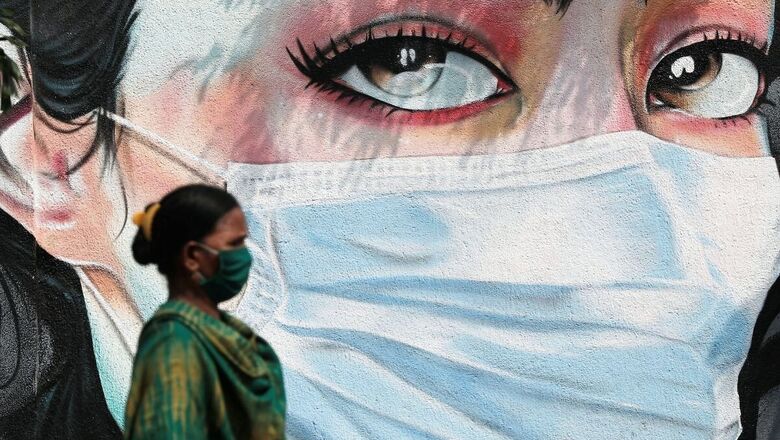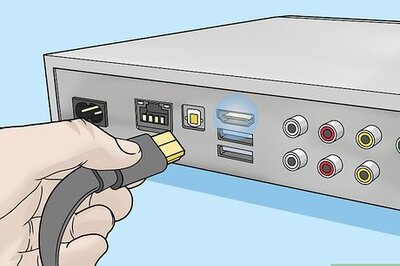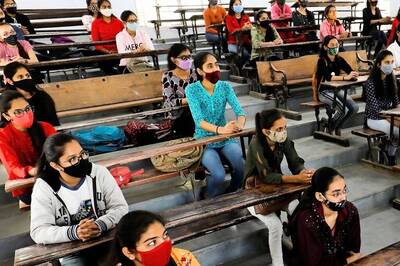
views
Weakness in hands and legs, increasing tingling or numbness, alteration in behaviour and memory, or fits: these are the first indications of neurological dysfunction that suggest consultation with a neurologist, especially if one is Covid-19 positive.
The neurological system is frequently involved in Covid-19 infections either due to direct virus invasion of neurological tissue that can cause encephalitis or because of clotting abnormalities triggered by the disease. But a major part of the Covid-19 injury across the world is because of misfired immunity that is created by the virus which targets the body’s own tissues. Many cases improve with appropriate immune-modulating and antiviral treatments.
A 40-year-old Covid-19 patient had so much weakness in his arms and legs that he was unable to walk and became bedridden. He was diagnosed with Guillain-Barre Syndrome (GBS) related to Covid-19. GBS is a condition in which the body’s immune system attacks the nerves and muscles.
The patient was successfully treated by a team of doctors led by Dr Praveen Gupta, director and head of neurology at Fortis Memorial Research Institute (FMRI), Gurugram.
“His nerves were severely damaged and were conducting sensations very slowly. This happens due to a misdirected immune attack on the nervous tissue which damages the membrane of the nerve cells,” said Dr Gupta.
The doctor told News18 that the Covid-19 patient was staring at lifelong disability. He said that the man’s nerve conduction velocity (NCV) showed demyelinating neuropathy, a neurological disorder characterised by prolonged weakness and impaired sensory function in arms and legs. NCV measures how fast an electrical impulse moves through one’s nerve. The patient’s cerebrospinal fluid (CSF) protein – a clear bodily fluid that cushions and protects the brain and spinal cord- was also marginally raised.
“We treated him with intravenous immunoglobulin (IVIG) which neutralised abnormal immunity. IVIG is used to treat autoimmune disorders, and idiopathic diseases. He became Covid-19 negative subsequently. He is now able to walk and can carry out routine activities,” said Dr Gupta.
This is one of the few cases of GBS related to Covid-19 which is being seen in patients. The doctor told News18 that this is his fourth patient in a series of GBS cases seen during and after Covid-19. Apart from GBS, other neurological disorders like encephalitis (inflammation of the brain), myelitis (inflammation of the spinal cord), strokes and fits have been seen in multiple patients infected by the novel coronavirus.
A young male Covid-19 patient was brought to the emergency department in a state of coma and with seizures. His seizures stopped and he became conscious within the next 24 hours. Gradually, he was taken off the ventilator after three days. He developed a fever and decreased oxygenation and cough which persisted for one week. He improved with hydroxychloroquine (HCQS) and antibiotics and anti-seizure medications and became febrile. He was discharged after two Covid-19 reports came negative without any neurological damage in a recovered state.
Dr Vikas Sharma, senior neurologist, told News18, “The virus can bind ACE2 receptors (a specific protein that allows the virus to infect human cells) and reach the central nervous system. It can cause inflammation leading to encephalitis and/or meningitis. The inflammation of the brain can cause neurochemical imbalance giving rise to seizures. It can even cause increased clotting giving rise to stroke which is seen in 5 per cent of patients.”
A new study published in the journal Annals of Clinical and Translational Neurology highlights a “range of neurologic manifestations, which occurred in more than four fifths of Covid‐19 patients hospitalised in our hospital network system”.
Another senior neurologist, Dr Biplab Das, said neurological manifestations related to Covid -19 are increasingly being recognised. “We have seen patients who were presented with flu-like symptoms and developed neurological problems and also those who developed neurological problems first followed by other flu-like symptoms,” he said.
Read all the Latest News and Breaking News here



















Comments
0 comment